Organic low-acid coffee is ideal for people with a particularly sensitive stomach and metabolism who may have a harder time enjoying a typical cup of coffee. The market is filled with all kinds of organic low-acid coffee brands, each promising a unique experience. Continue reading to discover the best organic low-acid coffee brands.

Today’s article aims to help you understand organic low-acid coffee a bit more, and hopefully find the best organic low-acid coffee for your needs.
Table of Contents
Top-Rated Organic Low-Acid Coffee (Summary)
- USDA Certified Organic: Yes
- Coffee type: Arabica
- Caffeinated: Yes
- Acidity: Low
- Roast: Dark
- Flavor: Complex and lingering
- Form: Beans, grounds, or steeped bags
- USDA Certified Organic: Yes
- Coffee type: Arabica
- Caffeinated: Yes
- Acidity: Low
- Roast: Medium
- Flavor: Chocolate, nuts, and tangerine
- Form: Beans, deep grind, espresso grind, and French press grind
- USDA Certified Organic: Yes
- Coffee type: Arabica
- Caffeinated: No (decaf)
- Acidity: None
- Roast: Medium
- Flavor: Regular
- Form: Beans or grounds
- USDA Certified Organic: Yes
- Coffee type: Arabica
- Caffeinated: Yes
- Acidity: Low
- Roast: Dark
- Flavor: Variety pack
- Form: Coffee K cups
- USDA Certified Organic: Yes
- Coffee type: Arabica
- Caffeinated: Yes
- Acidity: Low
- Roast: French roast
- Flavor: Bourbon pecan
- Form: Grounds
Top-Rated Organic Low-Acid Coffee – Reviews
So, which organic low-acid coffee should you go for? To simplify things, we’ve compiled a list of the best organic low-acid coffees out there, all of which have received rave reviews from customers.
1. LifeBoost Embolden Dark Roast
The first entry in our list is the LifeBoost Embolden Dark Roast organic coffee, a rich and flavorful coffee that has been designed with low acidity in mind.
LifeBoost Embolden Dark Roast is organic, Fairtrade certified, and Non-GMO Project verified, meaning that you can be sure that you’re getting a healthy and ethically sourced cup of coffee.
The beans are single-origin and of the highest quality, and they were made to be low-acid by being sun-dried and washed with spring water, so don’t worry about any chemicals.
Imagine that your average cup of coffee has a pH of around 4.8 or lower. This blend has a pH of 6, which is almost neutral (7).
Because of the efficiency of the processes involved, anyone can enjoy this coffee, even those suffering from GERD or people who already have issues with their teeth enamel.
As you can expect from a dark roast, the flavor feels rich and full-bodied, with plenty of complex aftertastes that linger on your tongue long after you’ve swallowed that gulp of coffee.
Last but not least, another thing about LifeBoost Embolden Dark Roast that we liked is how it delivers the product.
The website allows you to make single purchases or even enlist in subscription plans and have the coffee delivered to your doorsteps every few months.
All in all, we were very impressed by LifeBoost as a whole, and we went ahead and tested all of their products and documented our findings in a dedicated LifeBoost coffee review.
Pros:
- Rich and full-bodied flavor
- USDA organic certification
- Sun-dried and washed with spring water
- Available in beans, grounds, or steeped bags
Cons:
- Slightly more expensive than some of the other options on our list
If you’re looking for organic low-acid coffee because of health issues, you can’t get any healthier than with LifeBoost Embolden Dark Roast!
2. Volcanica Low-Acid Coffee
The next entry on our list is yet another big name in the organic coffee industry, and it’s called Volcanica Low-Acid Coffee.
The coffee beans used in Volcanica Low-Acid Coffee come from Brazil, Sumatra, and other areas where Arabica beans are grown at lower altitudes.
Volcanica Low-Acid Coffee is also USDA organic certified, which is always a good sign, and it’s also Non-GMO Project verified and Fairtrade certified.
Volcanica Low-Acid Coffee is not as expensive as the Lifeboost coffee we just talked about, but the quality of the beans comes in in a very close second.
In terms of flavor, Volcanica Low-Acid Coffee organic coffee has a rich and full-bodied taste, with chocolate and nutty undertones that give it a lot of complexity.
The best part about Volcanica organic coffee is that it’s available in a wide variety of grinds, so you can choose the one that best suits your taste, even if that means opting for espresso.
The coffee is then roasted in small batches to ensure quality control, and the result is a rich and flavorful cup of coffee with hints of chocolate, nuts, and even tangerine.
If you like how the coffee presents itself so far, know that you can buy it in the form of a 16 oz. bag, a 3 lbs. 3-pack, or one big 5 lbs. bag to which you’ll get a discount.
Pros:
- Available in a wide variety of grinds
- USDA organic certification
- Non-GMO Project verified
- Fairtrade certified
Cons:
- Not single-source
Volcanica Low-Acid Coffee is proof that organic and low-acid coffee can taste good and be affordable at the same time.
3. Tyler’s Coffee No Acid Organic Decaf Ground Coffee
Many people take their stomach issues very seriously, and for them, the biggest (and sometimes only) priority is finding the least acidic coffee.
If you’re one of them, you might want to give Tyler’s Organic Decaf Coffee a try since it’s one of the few coffee brands out there that have near-neutral pH coffee.
The secret lies in the way the coffee beans are roasted. While they didn’t make the exact process public, besides giving the coffee beans their iconic taste, it also removes any lingering tannins and fatty acids.
This makes Tyler’s Coffee No Acid Organic Decaf Ground Coffee a lot safer for anyone suffering from all kinds of stomach ailments, but those of you who care about the look and health of your teeth might want to consider switching to this coffee as well.
Tyler’s Coffee No Acid Organic Decaf Ground Coffee is also USDA organic certified, and it’s made with 100% organic Arabica beans that are roasted in small batches to ensure quality. Then they are ground and packaged in the USA.
We liked this brand, in particular, because they also have a regular non-decaf version of their coffee that’s also acid-free, so those of you looking for an acid-free caffeine fix should check out their regular blends.
Pros:
- Nest-to-neutral pH
- USDA organic certification
- Made with organic Arabica beans
- Ideal for those with severe stomach and dental issues
Cons:
- The price tag
Go ahead and give Tyler’s Coffee No Acid Organic Decaf Ground Coffee a try. It may be what the doctor ordered.
Several well-known brands have decaf coffee blends. If you want more decaf options, check out this list of the best organic decaf coffee brands!
4. San Francisco Bay Coffee OneCUP Variety Pack
If you’re not much of a fan of brewing your coffee from scratch and prefer using a coffee pod machine, you’ll love the San Francisco Bay Coffee OneCup Variety Pack.
These OneCUP pods are compatible with most Keurig machines, and they’re filled with 100% organic Arabica beans that have been roasted in the USA.
Besides, it’s a variety pack, so it’s ideal for those who easily get bored of a single flavor. As such, here are the blends included in the variety pack:
- Organic Rainforest Blend
- Breakfast Blend
- French Roast
- Fog Chaser
The San Francisco Bay Coffee OneCUP Variety Pack is available in several sizes, including packs of 12, 36, 40, 80, and 120 pods. The pods will work with any K cup style single-serve brewers, including Keurig 2.0., so don’t worry about any incompatibilities.
The coffee inside the pods is not the only thing that’s organic since the pods themselves are made using plant-based materials and are certified fully commercially compostable by BPI.
Pros:
- Compostable pods
- Several different blends
- USDA organic certification
- Made with organic Arabica beans
Cons:
- The pods could use some design improvements
If you want low-acid organic coffee in the form of coffee pods, look no further than the San Francisco Bay Coffee OneCup Variety Pack.
The San Francisco Coffee Company isn’t the only one that makes amazing low-acid coffee K cups. In fact, we’ve created a list of the best low-acid coffee K cups that you can try!
5. Puroast French Roast Low-Acid Ground Coffee
If you have a soft spot for French roasts, you’ll then the Puroast French Roast Low-Acid Ground Coffee should definitely be on your list.
Puroast French Roast Low-Acid Ground Coffee is made with a unique roasting process designed to reduce the coffee’s acidity by up to 70%. It’s also infused with seven times more antioxidants than green tea, so it’s gentle on your stomach and good for your health.
Puroast roasts their coffee beans using what’s called a slow-roasting process, which reduces the coffee’s acidity and brings out its natural sweetness and flavor.
Puroast French Roast Low-Acid Ground Coffee is also non-GMO, organic, and Fair Trade certified, so you can be sure that it’s high-quality and ethically sourced from the foothills of the Andes Mountains.
The secret to their unique flavor and naturally low acidity lies in the roasting process, resulting in a very smooth and rich coffee that you’ll enjoy sipping until the very last drop, without any bitter aftertastes.
Pros:
- Seven times more antioxidants than green tea
- 70% less acidic than typical coffee
- Slow-roasted for reduced acidity
- Smooth and rich flavor
Cons:
- The grounds are a bit too fine to be used for certain coffee brewing methods
If you have a soft stomach and a soft spot for complex flavors, give the Puroast French Roast Low-Acid Ground Coffee a try!
Organic Low-Acid Coffee: Everything You Need to Know
The terms organic and low-acid may be new for many of our readers, so the first sections of this guide will be dedicated to teaching you what organic coffee is and the benefits of organic low-acid coffee.
After that, we’ll get into our recommendations for the best organic low-acid coffee brands.
What Does Organic Coffee Mean?
Organic coffee is made from beans grown without the use of harmful pesticides and chemicals. Farmers that grow organic coffee must adhere to certain standards set by the country they are growing in, ensuring that their practices are safe for the environment and the workers on the farm.
What Does Low-Acid Coffee Mean?
Low-acid coffee is coffee that had its pH greatly decreased through various methods, either by growing them in a certain environment or brewing them a certain way.
Normally, coffee is slightly acidic, with a pH level of around 5, and people that suffer from acid reflux or other gastrointestinal issues may find that coffee aggravates their condition.
More so, low-acid coffee is a term used to describe specific coffee breeds grown specifically for their naturally alkaline properties.
How Is Low-Acid Coffee Made?
There are several ways to make low-acid coffee, and some methods can be done at home, while others need to be done by the farmer or the coffee processor.
- Type of coffee beans: The type of coffee beans grown can also impact the acidity of coffee. For example, Arabica beans are known for their sweeter taste and low acidity, while Robusta beans are the complete opposite, being quite bitter with higher acidity. Most organic low-acid coffee brands use Arabica beans in their blends, as they provide a more pleasant taste while also reducing the risk of potential stomach issues.
- Elevation: The altitude at which coffee is grown can also increase or decrease the resulting brew’s acidity. Coffee beans grown at a higher altitude tend to be more acidic than those grown at lower altitudes. Organic low-acid coffee brands will often source their beans from low-altitude farms to further reduce their final product’s acidity.
- Regular or decaf coffee: A coffee’s acidity is closely tied to its caffeine content, and that’s why you may notice that a lot of the low-acid coffees that are available, organic or not, also happen to be decaf. Decaffeination processes usually involve the use of chemicals. However, a few organic methods can be used to remove the caffeine while still keeping the beans organic, one very popular method being the Swiss water process.
- The brewing method: How you prepare your coffee can also affect the acidity levels. For example, cold brewing coffee results in a less acidic cup of coffee than hot brewing methods. This is because hot water extracts more acids and oils from coffee beans than cold water. As a result, organic low-acid coffee that has been cold brewed is often considered the best option for people with sensitivity.
Why Choose Organic Low-Acid Coffee?
There are a few benefits that organic low-acid coffee has over regular coffee.
- Much healthier: Organic coffee is free of harmful pesticides and chemicals, making it a healthier choice for those looking to cut down on their exposure to these potentially harmful substances.
- Tastier: Organic coffees tend to taste fruitier and brighter than non-organic coffees, making them more enjoyable for those who prefer brighter coffee cups.
- Easier on the stomach: Organic low-acid coffees are easier on the stomach for those with sensitive stomachs or acid reflux, making them the perfect choice for those who want to enjoy a cup of coffee without worrying about indigestion.
Some coffees are better than others, so the next section of our article will act as a buying guide.
Organic Low-Acid Coffee – Buying Guide
When it comes to organic low-acid coffee, you should keep a few things in mind to make sure you’re getting the best possible product.
Organic Certification
When you’re looking for organic coffee, make sure to check for the USDA organic certification, which is the most reliable organic certification in the United States.
Many coffee manufacturers will try to trick you into thinking that their coffee is organic by putting all kinds of fancy organic-looking labels on their products.
However, the only way to ensure that coffee is organic is to carefully look at the label and check whether it has a seal from a reputable organic certification body.
Arabica or Robusta
As we mentioned earlier in our article, Arabica coffee beans are more gentle on your stomach than Robusta coffee beans because they are naturally less packed with acids.
So, whenever you want to try a new brand of coffee, make sure that it’s 100% Arabica and that it’s not a blend of Arabica and Robusta beans.
Roast Levels
If acidity is your main concern, always stick to coffee made using medium or dark roast beans since these tend to be a lot less acidic than other roasts.
Light roasts are typically more acidic, and while they do tend to have a much more complex flavor with plenty of fresh aftertastes, those with stomach or dental issues may want to stick to the healthier options.
Grind Size
Since the grind size of your coffee can affect the acidity of the brew. Certain brewing methods are much more efficient at making low-acid coffee than others, the best brewing method being cold-brewing.
Because of this, it’s best to buy coffee grounds (or grind your whole coffee beans) with a coarse grind since these are the best grinds for cold-brewing.
Price
Organic coffee costs a lot more than regular coffee, and low-acid blends are even more expensive, so finding ways to pay the least amount of money for organic low-acid coffee is always a good idea.
The best way to do this is to look for organic coffee on sale or check out online stores like Amazon, where you can find some great deals on organic coffee when you buy it in bulk.
You can also find organic coffee subscriptions, which are usually a lot cheaper than buying organic coffee in stores, like the ones from LifeBoost.
Best Organic Low-Acid Coffee – FAQ
If you have any particular questions about organic low-acid coffee, check out our FAQ section below, where we answer some of the most commonly asked questions about this type of coffee.
What brand of coffee is the least acidic?
The coffee brand that we found provided the least acidic coffee is Tyler’s Coffee.
Is organic coffee less acidic?
There is no correlation between coffee being organic and being less acidic since acidity is mostly affected by the type of beans used and the methods used for drying and roasting.
Thus, you can have high organic coffee with a high acidity level and conventional coffee with almost zero acidity.
What coffee is good for acid reflux?
If you suffer from acid reflux, then the best coffee you could drink is a cold brew made from 100% Arabica beans grown at lower elevations and dark roasted.
How can I make coffee less acidic?
There are several different ways to make coffee less acidic, such as using freshly roasted beans in small batches, using only Arabica beans, or brewing for a longer time. Another thing you can try is adding milk, creamer, and coffee tamer, or using darker roasts.
What is the healthiest coffee brand?
If you’re thinking about living a long and healthy life, then LifeBoost coffee should be your go-to choice. They are 100% certified organic, and they only use Arabica beans that are grown without pesticides at high altitudes.
Best Organic Low-Acid Coffee – Closing Thoughts
We hope that our article helped you learn more about organic low-acid coffee and how it can benefit your overall health.
As we mentioned earlier, organic coffee will always be more expensive than regular coffee, but if you want to improve your health, it’s definitely worth the investment.
Thanks for reading!
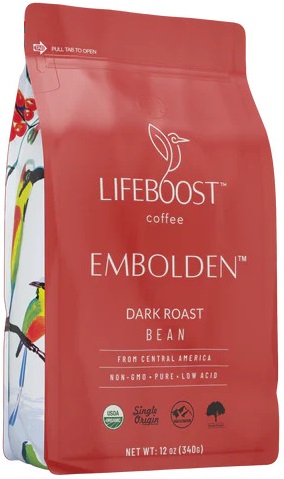
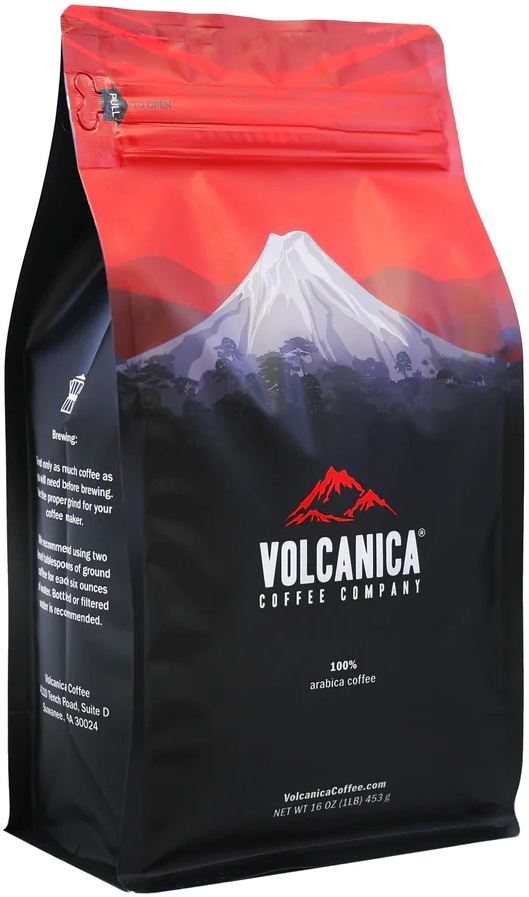
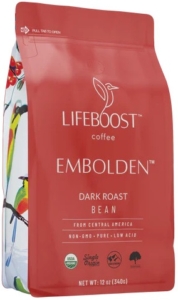
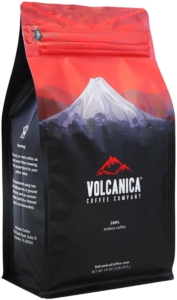
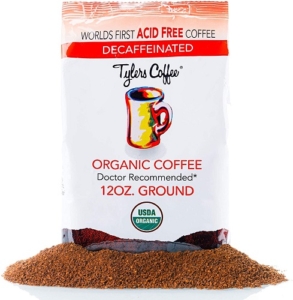
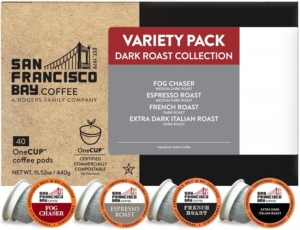
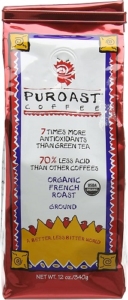
Leave a Reply